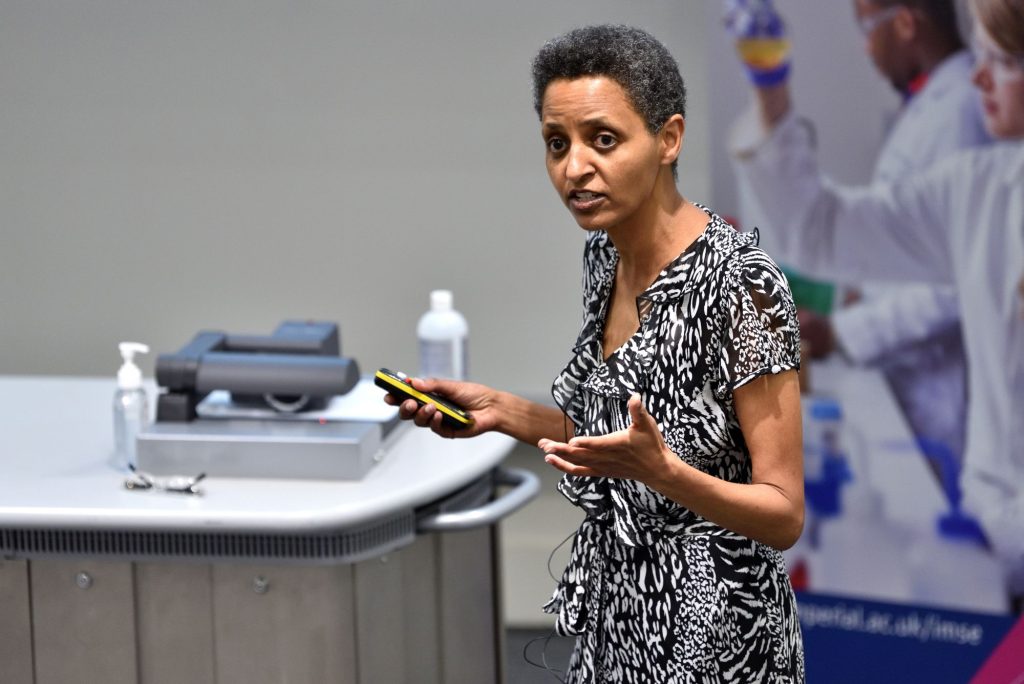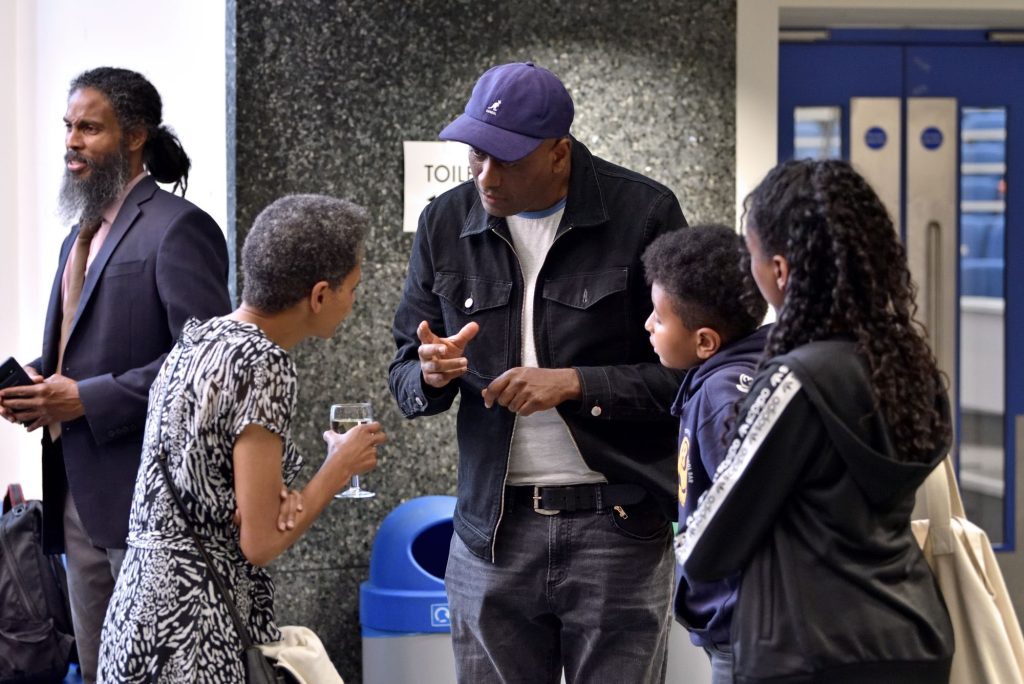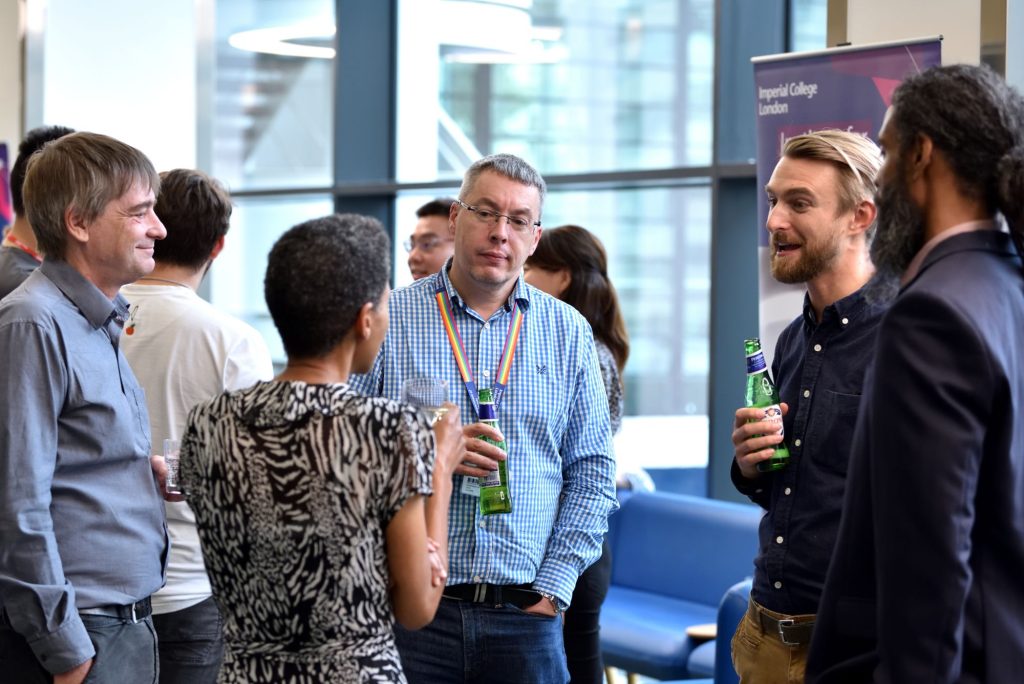On 24th June, we had one of IMSE’s yearly Big Days: the annual lecture, supported by the gift of Dr Theo George Wilson. This year the speaker was Professor Sossina Haile of Northwestern University, who has pioneered the development of solid acid fuel cells.

Professor Haile showed the urgent need for technologies which enable non-carbon-emitting fuel sources. Fuel cells are promising for storing the intermittent excess electrical energy from the renewables grid. They store this as chemical energy, often hydrogen, but possibly also ammonia. She explained how her cells work and explored some of the challenges in improving their performance and reducing the resources needed to make them. She also spoke about climate equity: making sure that the rising energy needs of the global south are met using solar, wind and hydroelectric resources.
Read our previous blog post about electrocatalysts here
After the lecture we got into the Q&A, which showed how the audience’s interests went deep into both the science and also the social implications of Sossina’s work and its impact.
Socially relevant work
An A-level chemistry teacher in the audience said that most of his brilliant students go into medicine, not into materials. He asked how he could support more of them to make the choice to study chemistry or materials. Sossina said: “I think that people see medicine as being much more of a socially relevant path than energy. But I think it’s becoming clearer as more and more catastrophes occur, that [energy] is also socially relevant. So I think that’s the way to maybe approach it.” Professor Nic Harrison, co-director of IMSE, said he had noticed increasing numbers of students joining Imperial who are interested in sustainability research, suggesting a change in perception.
Which fuel is the best, ammonia or hydrogen?
In Professor Haile’s talk, she described cells which make electricity out of hydrogen, with and without the preliminary step of making the hydrogen from ammonia. An online questioner asked: what are the advantages of using ammonia over hydrogen for grid storage? Sossina explained that ammonia is much easier to liquefy. It has a much higher boiling point than hydrogen, so needs less cooling or applied pressure to liquefy. However ammonia is highly toxic, so it’s unlikely it will ever be used in consumer products. In more controlled and high volume industrial settings, this could be a useful solution.

What’s the advantage of storing hydrogen?
An industrial representative asked: isn’t the loss of efficiency to convert renewable electrons to hydrogen and then back to electricity too great to make this technology useful? Sossina replied that she’d have agreed with him 10 years ago, and referenced her own TED talk on solar fuels in 2012.
But, she said, we need to find things to do with excess renewable electricity in the grid. Making hydrogen (or powering any chemical synthesis) is a good storage option. It’s also more convenient than batteries, given that very large amounts of energy need to be stored. Fuel cells are very small but can be attached to a fuel tank that can be as large as you need. In contrast, the greater the amount of energy you want to store, the bigger the battery you need. Chemical fuels can also be shipped more easily than heavy batteries. However, there will always be situations when batteries are better suited.
IMSE says thanks
Professor Nic Harrison concluded with a vote of thanks on behalf of IMSE. “That was an absolutely wonderful example of something that set out a global challenge problem; some very interesting technical solutions and your absolutely brilliant work; and then actually put it into a political context for us as well.”
This is the kind of work that IMSE exists to promote. We’re really excited and honoured that Professor Haile joined us this year.

Who should we invite in 2023?
This is the fourth IMSE annual lecture. Previous speakers have included Theresa Lambe (covid vaccine development), Saiful Islam (materials for green energy) and Tony Wood (pharmaceutical drug development). All these speakers combined one of IMSE’s grand challenges with molecular science and engineering. What field do you think we should focus on next year? Who would you like to hear speak? Send your suggestions to imse@imperial.ac.uk.